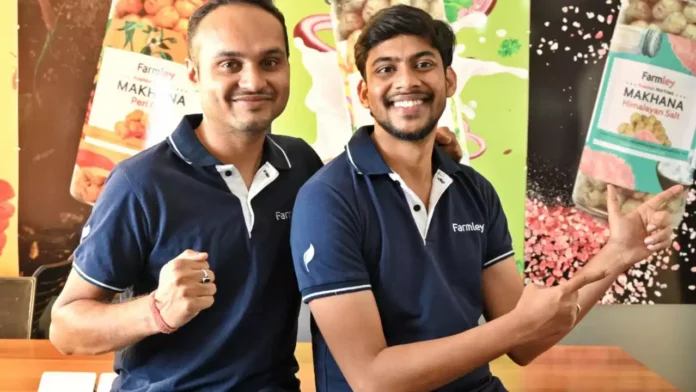Farmley, a prominent name in the dry fruits, nuts, and snacks industry, is gearing up for a transformative phase this festive season. Co-Founder and CEO Akash Sharma has laid out an ambitious plan to double the brand’s revenue, product portfolio, and retail touchpoints within the next six months.
With a strategic plan in place, Farmley is poised for exponential growth. “We anticipate doubling our revenue in the next six months, driven by festive sales and increased gifting. Our retail touchpoints will also see a significant expansion,” Sharma predicts.
The brand’s recent move to eliminate palm oil from its products has been a hit, and there has been a positive consumer response.
“We are not a health brand, but a delicious snacking brand that focuses on taste above all else. But rest assured that anything from Farmley’s product portfolio is inherently healthy. And our recent move to eliminate palm oil from its products is a testament to its commitment to health and quality. We transitioned from using palm oil to healthier alternatives like olive oil based on customer feedback. Our date bites, made without added sugar, have been a hit,” Sharma states.
Continue Exploring: Farmley champions healthy snacking with transition to 100% palm oil-free products
Farmley’s brand evolution includes a B2B focus to a B2C powerhouse post-COVID. The company initial offerings included basic dry fruits and nuts. Over the years, it has diversified into flavored makhanas, dry fruit mixes, healthy desserts, and on-the-go munchies. “Today, our portfolio boasts over 70 SKUs,” he explains.
The Manufacturing Edge
Sharma attributes his brand’s success to various factors, one being its manufacturing process.
“We have always focused on scaling our operations and product range strategically. With our five manufacturing units located near the primary sources of raw materials, we ensure top-notch quality and consistency,” says Sharma. These units are spread across Bihar, Farrukhabad, Indore, Bangalore, and Sani, each dedicated to specific products like makhana munchies, imported goods, cashews, and raisins.
According to him, Farmley’s decision to maintain in-house manufacturing has been pivotal. “Having our own units allows us to control quality, manage costs, and ensure a steady supply. This model has given us a significant edge in terms of pricing, quality consistency, and supply chain efficiency,” Sharma elaborates.
He also touches upon the challenges and benefits of having multiple manufacturing units. “While managing five units adds complexity, it offers us logistical advantages and reduces costs. Being close to the raw materials minimizes stock-out issues and ensures better pricing and quality consistency,” he adds.
Tapping into Tier 2 and Tier 3 Markets
Initially a digital-first brand, Farmley has seen substantial growth in offline retail as well. “We started with e-commerce and marketplaces, but our offline presence in modern trade, general trade stores, hotels, airlines, and vending machines has grown significantly. Our goal is to be present wherever consumers want to snack,” Sharma emphasizes.
To continue the same success story, Sharma acknowledges the untapped potential in Tier 2 and Tier 3 cities, as he plans to increase his footprints. “There’s a high spending power in these markets, and consumers are willing to pay for premium products with good taste and health benefits. We are focused on making our products accessible in these regions,” he says.
Continue Exploring: Healthy snacking brand Farmley set to expand retail presence, targets 30-40% offline sales share by 2026
A Promising Future
So far, the brand caters to 2.5 to 3 lakh customers in a month. With the millennials and GenZ as a target audience, Farmley gears up for this exciting phase. Sharma remains optimistic about the brand’s future. “Our growth has been consistent, and we expect it to continue. By uncovering niches and catering to diverse consumer needs, we are confident in our ability to scale and succeed,” he concludes.
Farmley’s journey from a B2B supplier to a B2C leader in the healthy snacking industry is a testament to its innovative approach, commitment to quality, and strategic foresight. The next six months promise to be a transformative period for the brand, marking a new chapter in its growth story.





